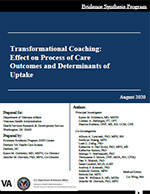
Prepared by:
Evidence Synthesis Program (ESP) Center
Durham VA Health Care System Durham, NC
Karen M. Goldstein, MD, MSPH, Co-Director
Jennifer M. Gierisch, PhD, MPH, Co-Director
Recommended citation:
Ballengee LA, Rushton S, Lewinski AA, Hwang S, Zullig LL, Ball Ricks KA, Brahmajothi MV, Moore TS, Blalock DV, Ramos K, Cantrell S, Kosinski AS, Gordon AM, Ear B, Williams JW, Gierisch JM, Goldstein KM. Transformational Coaching: Effect on Process of Care Outcomes and Determinants of Uptake. VA ESP Project 09-010; 2020.
Download PDF: Complete Report, Executive Summary, Report, Appendices
High-quality health care is a priority for patients and clinicians alike. Quality improvement (QI) is a framework that guides health system actions to improve the delivery of high-quality health care. Quality improvement activities seek to promote high-quality health care by applying innovations, rapid-cycle testing, and spreading best practices that produce meaningful improvements. However, conducting QI activities in an effective and accurate manner may be challenging for health care teams with competing demands. Health care teams often need dedicated support to incorporate QI activities into busy clinical practices. One method for providing support around QI activities is through longitudinal coaching from an expert trained in QI and related methods (eg, Lean, Six Sigma, system redesign). Within the VA, transformational coaching is one commonly used strategy for the provision of longitudinal, expert support to clinical teams seeking to engage in QI processes.
Transformational coaching is a team-centered approach to support an interdisciplinary health care delivery team in pursuit of catalyzing and building capacity for sustained change and enabling improvement. Transformational coaches provide support by assisting with goal setting and attainment, connecting teams to system-level resources for change, and improving efficiency and team dynamics around improvement processes. The coach is not part of the particular health care practice or team receiving the coaching, but can be from the larger health care system in which the team or practice sits. The coach role is agnostic to the clinical content area and does not require topical expertise. Since 2012, the VA has employed transformational coaches to advance numerous national collaboratives (eg, Patient Aligned Care Team [PACT] Collaborative, Transitioning Levels of Care Collaborative).
This report seeks to support future development of transformational coaching by addressing several knowledge gaps: (1) how the impacts of transformational coaching-like interventions have been measured; (2) what the effect of coaching is on practice- or clinical team-level behaviors (or process outcomes); and (3) what the barriers and facilitators are to the uptake of transformational coaching. In recognition that transformational coaching is not explicitly defined outside of the VA nor studied in the peer-reviewed literature, we used a broad search strategy to identify interventions that shared the essential ingredients that must be maintained to ensure fidelity to the transformational coaching intervention as defined within the VA. Specifically, we incorporated related concepts from the fields of QI, improvement science, and implementation science, which themselves employ overlapping terms and methods pertaining to the support of clinical teams and practices in the uptake and improvement of evidence-based clinical processes.
KQ 1a: What outcomes have been used to assess the effects of transformational coaching across practice, provider, and patient levels?
KQ 1b: What are the effects of transformational coaching for team-based health care improvement and practice change efforts on process outcomes, specifically:
KQ 2: What are the identified barriers and facilitators that impact the uptake of transformational coaching in a large health care system such as the VA?
Transformational Coaching: Effect on Process of Care Outcomes and Determinants of Uptake (Management eBrief)
Ballengee LA, Rushton S, Lewinski AA, et al. Effectiveness of Quality Improvement Coaching on Process Outcomes in Health Care Settings: A Systematic Review. Journal of General Internal Medicine. Published online January 3, 2022. DOI: https://doi.org/10.1007/s11606-021-07217-2.
Rushton S, Lewinski AA, Hwang, S, et al. Barriers and Facilitators to the Implementation and Adoption of Improvement Coaching: A Qualitative Evidence Synthesis. Journal of Clinical Nursing. 2022;32(1-2):3-30. DOI: https://doi.org/10.1111/jocn.16247.